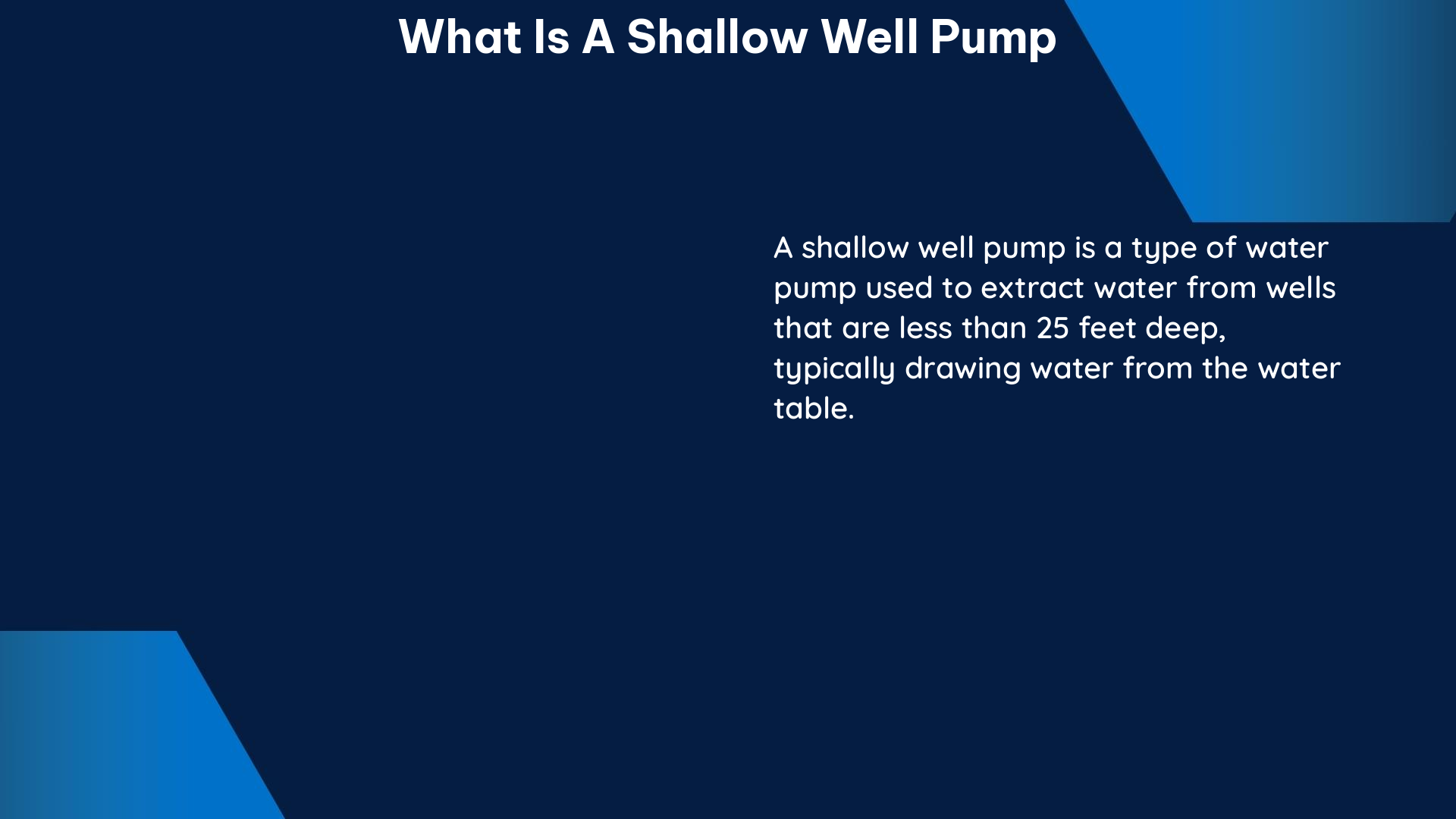A shallow well pump is a specialized water pump designed to extract water from wells with a pumping depth of less than 25 feet. These pumps are typically jet pumps, which use a venturi effect to create a pressure differential and draw water from the well. Shallow well pumps are often made of cast iron or stainless steel and are commonly installed outside the well, such as in a basement or pump house.
Key Characteristics of Shallow Well Pumps
-
Single Suction Pipe: One of the defining features of a shallow well pump is its single suction pipe, which draws water directly from the well to the pump. This distinguishes them from convertible jet pumps, which have two suction pipes and are designed for deeper well applications.
-
Versatility: Shallow well pumps can be used for both shallow and deep well applications, making them a flexible choice for many well owners. However, they may not be suitable for wells with a high total dynamic head or low yield, as they may not be able to generate enough pressure to lift the water to the surface.
-
Horsepower Range: Shallow well pumps typically range from 1/2 HP to 2 HP or more, depending on the specific application and water demand.
-
Flow Rate: The pump’s flow rate, measured in gallons per minute (GPM), is an important consideration as it determines the amount of water the pump can deliver to your home or business.
-
Total Dynamic Head: This includes the pumping water level, above-ground head, and friction losses in the casing, pipes, and fittings. It is a key specification to consider when choosing a shallow well pump.
Technical Specifications to Consider

When selecting a shallow well pump, there are several technical specifications to take into account:
Horsepower (HP)
The horsepower of a shallow well pump can range from as low as 1/2 HP to 2 HP or more, depending on the specific application and water demand. A higher horsepower pump will be able to deliver more water, but it will also consume more energy and may be more expensive to operate.
Flow Rate (GPM)
The flow rate of a shallow well pump, measured in gallons per minute (GPM), is a crucial factor in determining how much water the pump can deliver. Typical flow rates for shallow well pumps can range from 10 GPM to 50 GPM or more, depending on the pump size and well characteristics.
Total Dynamic Head (TDH)
The total dynamic head is the sum of the pumping water level, above-ground head, and friction losses in the casing, pipes, and fittings. This measurement, typically expressed in feet, is essential in selecting the right shallow well pump for your application. A pump with insufficient TDH may not be able to lift the water to the surface.
Well Depth and Yield
The depth and yield of your well are also important considerations when choosing a shallow well pump. Shallow well pumps are designed for wells with a pumping depth of less than 25 feet, so it’s crucial to ensure that your well falls within this range. Additionally, the well’s yield, or the amount of water it can produce, should be compatible with the pump’s flow rate requirements.
Material Construction
Shallow well pumps can be made of various materials, including cast iron and stainless steel. Cast iron pumps are generally more affordable but may be more susceptible to corrosion, while stainless steel pumps are more durable and resistant to corrosion but may be more expensive.
Installation and Maintenance Considerations
One of the key advantages of shallow well pumps is their relative ease of installation and maintenance compared to deep well pumps. Since they are located above ground, they are more accessible and can be serviced more easily. However, it’s still important to follow proper installation procedures and regularly maintain the pump to ensure optimal performance and longevity.
Consulting with Professionals
To determine the best shallow well pump for your needs, it’s recommended to consult with a professional hydrogeologist or well driller. They can assess the specific characteristics of your well, such as depth, yield, and total dynamic head, and help you select the most appropriate pump for your application. This can help ensure that you choose a pump that will provide reliable and efficient water delivery for your home or business.
Conclusion
Shallow well pumps are a versatile and practical solution for homeowners and businesses with wells that are less than 25 feet deep. By understanding the key characteristics and technical specifications of these pumps, you can make an informed decision and ensure that your water supply needs are met effectively and efficiently.
References:
- Guide to Conducting Pumping Tests – Gov.bc.ca
- Well Pump Buyer’s Guide – How to Pick the Perfect Well Pump – Water Pumps Direct
- STATIC WATER 101 – YouTube
- How to Measure Static Water Level in Wells and Conduct Pump Tests – YouTube
- PRODUCTS – Red Lion Pump

The lambdageeks.com Core SME Team is a group of experienced subject matter experts from diverse scientific and technical fields including Physics, Chemistry, Technology,Electronics & Electrical Engineering, Automotive, Mechanical Engineering. Our team collaborates to create high-quality, well-researched articles on a wide range of science and technology topics for the lambdageeks.com website.
All Our Senior SME are having more than 7 Years of experience in the respective fields . They are either Working Industry Professionals or assocaited With different Universities. Refer Our Authors Page to get to know About our Core SMEs.